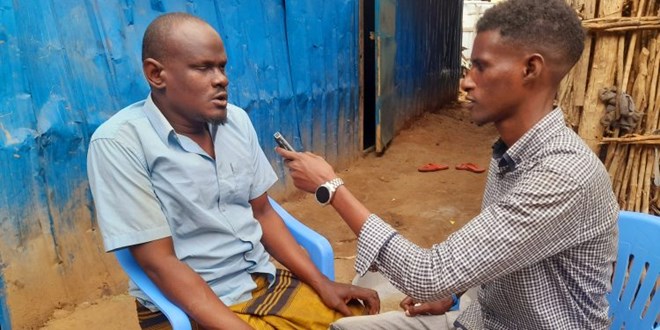
Saturday August 13, 2022

Caption: Ishaq Haydar, a blind farmer whose home was destroyed in July’s suicide bomb blast, sitting in his relatives’ compound in Jowhar/Mohamed Ibrahim/Ergo
(ERGO) – Ishaq Haydar Aqil, 45, a blind farmer and father of five children, lost everything he had in the deadly suicide car bomb blast that rocked Jowhar, regional capital of Somalia’s Hirshabelle state, in July, compounding a run of disasters that ruined his farm.
Unlike some of the other 120 families who lost their houses and businesses in the blast, Ishaq feels lucky to have found bedding and some space in the yard of a relative’s house in the city, albeit outside.
“We have inherited various challenges from the explosion, including sleeping rough in the house yard as the rooms were already full. We face cold and sometimes rainfall at night. Our house and property were hit by the explosion, but we thank God we are alive,” said Ishaq.
The family had lived in a hut for over 20 years, which they made using mud, cow dung and some tree branches. He still dreams of getting a rental house where he and his children can live comfortably. But even the cheapest houses in Jowhar renting for $30 would be out of reach given his incomes.
Ishaq earns a small amounts of money when he is called to read the Koran and pray for people in their houses. In one sitting that could last for a few hours, he makes just five dollars.
“Many people have lost their house in the explosion. The people who could reconstruct their houses have done so, however people living with disability like me have been forced to sleep rough in the cold,” said Ishaq.
His family used to live off their three-hectare farm on the outskirts of Jowhar, growing grain and vegetables. However, Ishaq had to abandon the land after four years of crop failure.
“I own a farm and for the fourth year running, all my efforts failed. Two years we encountered floods, another year was hampered by the locust plague, and this year we have been hit by drought. We have tried to plant maize but we haven’t even seen one plant sprouting up. I couldn’t waste away my investment anymore and so I gave up on the farm,” said Ishaq.
With the failed farm, his family now eats one meal instead of their previous two.
Mohamed Ali Hussein, another father of nine, had his small cafeteria and his house valued at $1,400 destroyed in the explosion. For the past 15, he had been earning a decent $15 a day, but now he has been reduced to taking loans to get food for his family.
“Since I was in business for a long time, I have established networks with businesspeople. I used to buy the food supplies but now they are giving it to me on credit,” said Mohamed.
Mohamed used to support four of his children’s university education at Plasma university, paying $120 per semester for each of them, and $30 for the younger ones in secondary school.
With the schools set to resume in two weeks he is worried that they might fail to enroll for their classes due to fee arrears.
“I didn’t have any plans for such a situation, that day [of the blast 17 July] I set out to earn a living as usual, but it is sad that I am among the jobless people in the streets now whom I used to scorn. I don’t have other skills, I only know how to make coffee and tea and that is how I supported my family,” said Mohamed.
The deputy minister of trade in Hirshabelle state government, Mohamed Yusuf Olow, who is on the joint ministerial committee assessing losses and overseeing recovery, told Radio Ergo they have been trying to raise funds to help the families affected by the explosion.
The blast, responsibility for which was claimed by the Al-Shabab militia group, targeted government officials at a hotel near the state president’s palace. Most of the 20 or so businesses affected were near this area.
The deputy minister said in the next three months they would be reconstructing the houses destroyed, giving priority to the vulnerable families, most of whom are farmers who were already in trouble due to crop failure